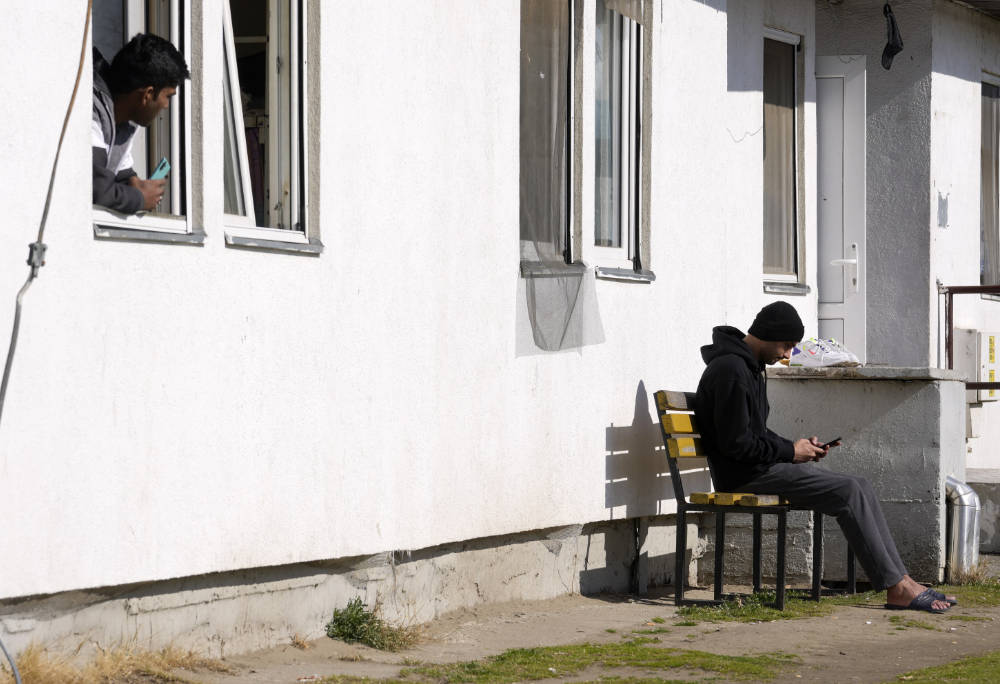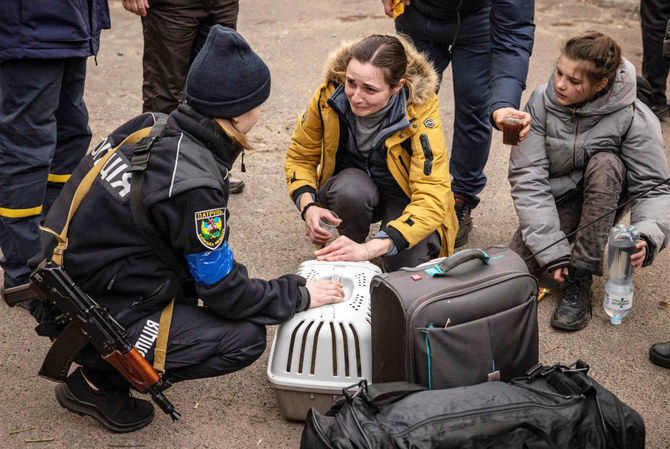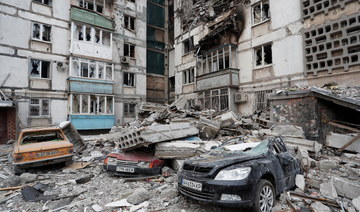BELGRADE, Serbia: When Russia launched its war, Hungary opened its borders for the tens of thousands of refugees escaping Ukraine. Other refugees have been left with no help in a field in Serbia.
After studying in Hungary for three years, Hasib Qarizada sought asylum there after his native Afghanistan unraveled in chaos last August. But rather than receiving refuge, Hungarian authorities whisked Qarizada over the border six months ago into neighboring Serbia, kicking him out into a country he didn’t even know.

Hasib Qarizada a student from Afghanistan rests outside his room in the "Krnjaca" refugee centre near Belgrade, Serbia, Thursday, Feb. 24, 2022. (AP)
“Police just came over and handcuffed me,” Qarizada told The Associated Press in Belgrade, the Serbian capital. “They told me ‘Don’t try to run away, don’t try to fight with us, don’t do anything stupid.’”
Left all alone in a field in Serbia with no one in sight for miles, the 25-year-old Qarizada had no idea where he was, where to go or what to do.
“I was a student, and they just gave my life a totally different twist,” he said. “They didn’t give me a chance to grab my clothes, my (phone) charger or my laptop or anything important that I would need to travel.”
He told the AP he “had no idea where Serbia was, what language they speak, what kind of culture they have.”
Hungarian police haven’t immediately responded to AP’s request for a comment on Qarizada’s expulsion in September.
While Hungary is notorious for how its treats migrants fleeing wars and poverty, Qarizada’s case points to a particularly sinister practice of sending people into a third country they hadn’t come from.
Rights activists in the region registered the first such case back in 2017, when a 16-year-old Kurd from Iraq was deported into Serbia from Hungary though he had initially entered Hungary from Romania and managed to reach Austria before he was sent back.
More recently, a woman from Cameroon who entered Hungary from Romania was sent to Serbia last December. Another African woman who flew in from Dubai, United Arab Emirates, a year ago also ended up in a field in Serbia.
“This is something that unfortunately has become normal, regular and something which cannot be considered as unusual,” Serbian rights lawyer Nikola Kovacevic said.
Qarizada’s expulsion illustrates the stark differences in the treatment of people from Ukraine and those from non-European war zones under right-wing Hungarian Prime Minister Viktor Orban.
Similarly, Croatia — another EU country that has been accused off using violence against migrants — has said Ukrainians can come and stay.
Activists have applauded the shift while also warning of discrimination against refugees and migrants from the Middle East and Africa, who for years have faced perils and pushbacks at the borders of Hungary, Croatia and other European nations.
“For those of us following these issues, it is hard to miss the stark contrast of the last few weeks with Europe’s harsh response to people fleeing other wars and crises,” said Judith Sunderland of Human Rights Watch. “A staggering number of people from Asia, Africa, and the Middle East die every year attempting to reach Europe.”
Zsolt Szekeres from the Hungarian Helsinki Committee noted that “the (Hungarian) government is trying their best to explain now why Ukrainians are good asylum-seekers and others are bad migrants.”
With Hungary’s April 3 election approaching, government spokesman Zoltan Kovacs dismissed as “fake news” media reports that authorities were discriminating even among the refugees arriving from Ukraine.
Border pushbacks, which are illegal under international law, means that people are sent from one country to another without consideration of their individual circumstances.
When, like Qarizada, they are expelled to a country they hadn’t come from, “the severity of the violation is higher,” said Kovacevic, the Serbian lawyer.
Qarizada’s deportation was even more drastic as he hadn’t arrived in Hungary along any illegal migration route. A self-financed student who shared an apartment and had an established life in Budapest, Qarizada sought asylum because the turmoil in Afghanistan meant his family could no longer pay his university fees and therefore he couldn’t renew his residence permit.
In rejecting his asylum application, activists say, Hungarian authorities disregarded the fact that Qarizada’s homeland of Afghanistan couldn’t be considered safe as the Taliban returned to power.
Qarizada told the AP that his family had connections with Afghanistan’s pre-Taliban government and were in danger of retribution. “They hardly go outside,” he said.
Helsinki Committee lawyers have taken Qarizada’s case both to the courts in Hungary and the European Court of Human Rights, arguing that his unlawful expulsion runs against the European Convention of Human Rights, Szekeres said.
A Hungarian court has ruled in favor of Qarizada, but the lawyers are now waging another legal battle to force Hungarian authorities to implement the decision and allow him to come back, he added.
“He applied for asylum, he was staying here, and he was in need of protection, and he was pushed out in a summary manner,” Szekeres insisted. “He was never given the possibility or option to explain his situation.”
For Qarizada, the days after the expulsion were the worst of his life.
Abandoned in Serbia, he walked for hours, finally reaching a gas station where a woman let him charge his phone and directed him toward the nearest asylum center. The facility was full so he slept outside for four nights.
“I felt very horrible ... because I was a normal student. I was studying, I was going to classes. I had my own friends. I had my own life,” he said. “I wasn’t doing anything bad.”
Karox Pishtewan, the Kurdish minor deported into Serbia in 2017 and who was granted asylum there, also told the AP that Hungarian police “just opened the gate and told us to go.”
“It was July and everything was green,” he recalled. “I was quite shocked. We hadn’t slept for three days and they just kicked us out there. I had no idea where I was and what was happening.”
Szekeres said the acceptance of refugees from Ukraine shows that solidarity with people in need has remained strong among ordinary Hungarian people despite the government’s years-long anti-immigration agenda.
“There is no difference between Ukrainian parents fleeing with their children and Afghan parents fleeing with their children,” he said. “This is a good reminder for everyone that asylum-seekers, no matter where they come from, need protection.”

























